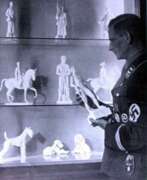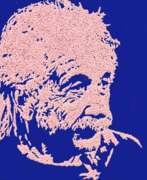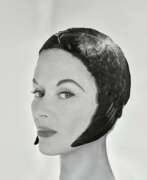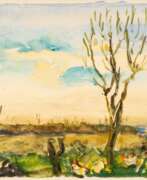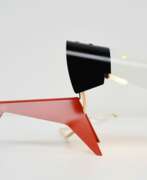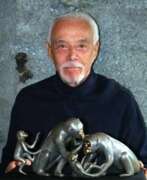Fashion designers 20th century
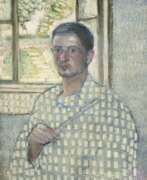

Vladimir Davidovich Baranov-Rossine (Russian: Владимир Давидович Баранов-Россине) was a master of the Russian avant-garde, a prolific painter, sculptor, and inventor, whose work significantly contributed to the Cubo-Futurism movement. Born on January 1, 1888, in Kherson, he was originally named Shulim Wolf Leib Baranov but is best known by his pseudonym, Daniel Rossine. His early artistic education took place in Odessa and then at the St. Petersburg Academy of Arts, laying the groundwork for his future as a revolutionary artist.
In 1910, Baranov-Rossine moved to Paris, a pivotal move that introduced him to the burgeoning European avant-garde scene. It was there, alongside other notable artists such as Marc Chagall, Osip Zadkine, Alexander Archipenko, and Chaim Soutine, that he became an inhabitant of the famous Parisian house "La Ruche." His innovative work, particularly the invention of the Optophonic Piano, which projected colors in sync with music, underscored his commitment to blending art and technology, a hallmark of his career.
Tragically, Baranov-Rossine's life was cut short when he was arrested by the Gestapo in 1943 and subsequently died in Auschwitz in 1944. Despite his untimely death, his legacy lives on through his contributions to modern art and technology. His works can be found in various museums and galleries, celebrated for their vibrant expression and avant-garde techniques that continue to inspire artists and collectors alike.
For those intrigued by Vladimir Davidovich Baranov-Rossine's pioneering work and its lasting impact on the art world, signing up for updates on new product sales and auction events related to this avant-garde master is highly recommended. This ensures enthusiasts and collectors are always informed about the latest opportunities to engage with Baranov-Rossine's remarkable legacy.
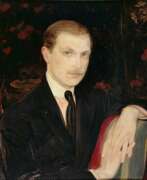

George Barbier was a French artist and illustrator, fashion designer, who influenced the development of the Art Deco movement.
George Barbier studied painting at the École Nationale Supérieure des Beaux-Arts in Paris. Initially he worked as an illustrator for several famous Parisian fashion magazines, and gradually his drawings began to define the style of women's clothing. The emergence of the Art Nouveau style moved Barbier to create luxurious fashions for cabarets, theaters, and movies. He depicted extravagant theatrical costumes with sparkling rhinestones, high headdresses and huge plumes. Barbier created stage costume designs for Diaghilev's famous Russian Ballet.
He also illustrated catalogs and many literary works, including works by Charles Baudelaire and P. Verlaine, and was an author and designer of jewelry.
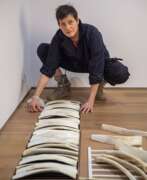

Alexandra Bircken is a German artist, designer and installer who graduated from the Central Saint Martin's College of Art and Design.
The main theme in Alexandra Birkcen's work is the shell. She explores and combines a variety of materials - wool, concrete, wood, bone, everyday objects and clothing, and creates sculptural objects from them. The artist also uses objects that she encounters in everyday life: cars, motorcycles, surgical shirts, rocking horses, skis. However, she strips them of their familiar contexts and surprises us with unusual combinations.
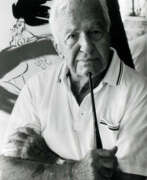

René Gruau was a French artist and illustrator, known for his work in fashion, advertising, and magazine illustration. He is considered one of the most influential fashion illustrators of the 20th century, and his distinctive style has had a lasting impact on the fashion industry.
Gruau was born in Italy and spent most of his childhood in France. He began his career in advertising in the 1920s, working for the agency J. Walter Thompson. He soon became known for his elegant, sophisticated style, and his ability to capture the essence of a product or brand in a single image.
In the 1940s, Gruau began working in the fashion industry, producing illustrations for magazines such as Vogue, Harper's Bazaar, and Elle. He became famous for his glamorous, sensual depictions of women, which captured the essence of the post-war era of elegance and sophistication.
Throughout his career, Gruau worked with some of the biggest names in fashion, including Christian Dior, Yves Saint Laurent, and Givenchy. He created many iconic images for these designers, including the famous "Bar" suit for Dior, and the "Mondrian" dress for Saint Laurent.
Gruau's work has been exhibited in museums and galleries around the world, and he has been the subject of several retrospectives. His influence can be seen in the work of many contemporary fashion illustrators, and his legacy continues to inspire new generations of artists.


Karl Otto Lagerfeld is a German fashion designer, designer, photographer, collector and publisher.
Karl found himself in the fashion world by chance, as he planned to work as an illustrator. At the age of 21, he entered the 1954 International Woolmark Prize and won first place for his sketch of a coat, which launched his career. For the next 65 years, fashion remained the foundation of his work, although he spent his life actively expressing himself in other areas of art.
In 1987, Karl shot his first advertising campaign and developed a passion for photography. In 1999, he opened his own photography studio in Paris, where he has taken countless images of the world's greatest figures in art and fashion. Many of Carl's photographs have also been used in art books. Karl was also a master of self-portraits: throughout his life he photographed and painted his iconic image.
A passionate bibliophile (his personal library numbered 300,000 volumes), Lagerfeld merged his photography studio with the 7L bookstore and later opened EDITIONS 7L, a publishing house specializing in books on design and photography. He was also involved in various interior design and architecture projects.
In 1965 Lagerfeld took over the Italian fashion house Fendi, where he created collections of leather and fur garments, and in 1983 he became the artistic director of the French house Chanel - with these companies he had lifetime contracts. In 1984, Lagerfeld founded his own fashion house, Karl Lagerfeld Impression.
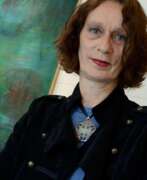

Yvonne E. Schweidtmann is a German artist who lives and works in Düsseldorf.
In 1995, she graduated from the Dusseldorf Academy of Art, participates in numerous exhibitions. Schweidtmann prefers to use emulsion paint, often applying it in several layers, so her paintings are very complex structures. Yvonne E. Schweidtmann is a versatile creator: She designed costumes for a dance performance as part of a concert at the Museum Island Gombroich.


Claude Viseux is a French painter and sculptor. Claude Viseux's works can be found in many public spaces in France and in museums around the world. He also participated in the design and creation of ballet sets and costumes.
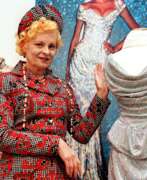

Vivienne Isabel Westwood, née Swire, is a British fashion designer, considered the founder of the punk style in high fashion.
A self-taught designer, in 1965 Vivienne met McLaren, the future manager of the punk band Sex Pistols. Together they began a career in fashion, opening Let It Rock, a kiosk that sold second-hand vintage 1950s clothing along with McLaren's collection of rock 'n' roll records. Westwood began creating clothing designs based on his provocative ideas. From the London store the couple owned in the early 1970s came their T-shirts, ripped and decorated with epathetic slogans and graphics, and black pants with S&M-style belts. Their boutique became the center of youthful global fashion.
In 1981, Vivienne Westwood created her own clothing brand, Vivienne Westwood, and developed a passion for historical costume. From the mid-1980s, Vivienne Westwood created collections drawing inspiration from classical sources and paintings, as well as historic British clothing.
Westwood was made an Officer of the Order of the British Empire (OBE) in 1992 and a Dame Commander of the Order of the British Empire (DBE) in 2006.
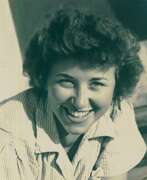

Suzie Zuzek was an American artist and textile designer whose work was mainly seen in Lilly Pulitzer dresses, textiles and furnishings from the 1960s to the 1980s, and became exclusively associated with the brand until its closure in 1984. In the early 21st century, she was eventually acknowledged as the creator of some of the most widely recognized textiles of the 1960s and 1970s. A retrospective exhibition of her designs, curated in 2019 and shown in 2021 at the Cooper Hewitt, Smithsonian Design Museum, both recognized the impact of her work, and brought her out of obscurity.
